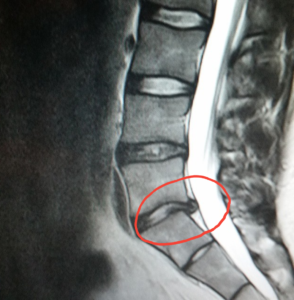What is a slipped/ herniated disk?
Also known as a prolapsed and bulging disk is where the gel in your disk protrudes out from the disk. Below is an image is my own slipped disk in my lower back.

Your spine is made up of a series of vertebrae stacked onto each other and cushioned by disks. These disks are shock absorbers and protect the bones (by absorbing the impact from running, lifting and twisting). Each disk has a soft, gel like inner portion and a tough outer ring. Injury or weakness can cause the inner portion of the disk to protrude through the outer ring as shown in the x-ray above. This can cause significant pain and discomfort.
If there is compression of your spinal nerves it will cause numbness and nerve pain and could even require surgery to remove or repair the damaged disk.
A slipped disk may occur in any part of your spine from your neck to your lower back (but the lower back is the most common). Your spine is a complex network of blood vessels and nerves and a herniated disk can place extra pressure on the nerves and surrounding muscles.
Symptoms of a slipped disk
Symptoms of a slipped disk include:
- pain and numbness (often on one side of the body)
- this may extends to your arms or legs
- it may worsens in the evening
- pain that worsens after standing/sitting for long periods
- pain even when walking or with certain movements
- unexplained weakness in your muscles
- a tingling, aching, or burning sensation
The types of pain can vary and I personally had a dull ache in my back that I felt like I needed to hit back in to place! Just don’t do this as you could make it worse! If the pain leads to tingling or numbness and affects your ability to control your muscles, see your doctor immediately.
What causes slipped disks?
A slipped disk occurs when the outer ring becomes weak or torn and allows the inner gel to slip out. A disk can slip out of place while you are twisting or turning to lift. Lifting heavy object can place too much strain on the lower back so be extra careful when squatting or deadlifting at the gym.
If you are overweight you are also at increased risk of slipping a disk because of the increased weight the disks must support. Weak surrounding muscles and an inactive lifestyle can also contribute to the development of a slipped disk.
Older people are more prone to experience a slipped disk because the disks lose some of their protective gel content as we get older and so can more easily slip out of place. It’s also more common in men than women!
Diagnosis of slipped disks
Your Doctor will check your nerve function and muscle strength in order to diagnose the source of the pain and discomfort. Medical history, symptoms and what activities cause your pain to worsen will be analysed. E.g. if you feel pain when moving or touching the affected area.
X-rays, CT and MRI scans can help view the bones and muscles of your spine and identify the affected areas. This should clearly identify the issues and allow suitable treatment.
Complications of a slipped disk
In extreme cases, and if left untreated it can lead to permanent nerve damage and cut off nerve impulses to your legs and lower back. This can lead to bowel or bladder control issues.
Saddle anesthesia can occur when the bulging disk compresses nerves and causes you to lose sensation in the back of your legs, inner thighs and rectum.
Although these are extreme cases, it’s very important to get it diagnosed asap and treated correctly.
How are slipped disks treated?
The treatment we offer at Bodilight will depend on the level of discomfort you are going through and how far the disk has slipped out of place.
An Osteopath or physical therapist can recommend exercises that can strengthen your back while reducing your pain. A lot of people can relieve slipped disk pain using regular Osteopathic treatment and an exercise program to stretch and strengthens the back and surrounding muscles.
Taking pain killers can also help in the short term whilst you strengthen the area. It may seem logical to stop physical activity while you’re in pain but this can actually lead to joint stiffness and muscle weakness. Try to remain as active as possible through stretching or low-impact activities such as walking and swimming.
If you do not respond to these treatments and exercised, your doctor may recommend surgery – especially if it starts affecting your muscle function.
A microdiskectomy is where a surgeon removes the protruding portion of the disk without removing the entire disk. In more severe cases, your doctor may replace the disk with an artificial one or remove the disk and fuse your vertebrae together.
Conclusion
A slipped disk occurs when the soft inner portion of the disk protrudes through the outer ring. Symptoms vary based on where the slipped disk occurs and if it compresses any of your spinal nerves.
Seek diagnosis and then treatment with your Bodilight specialist asap.




Leave A Comment